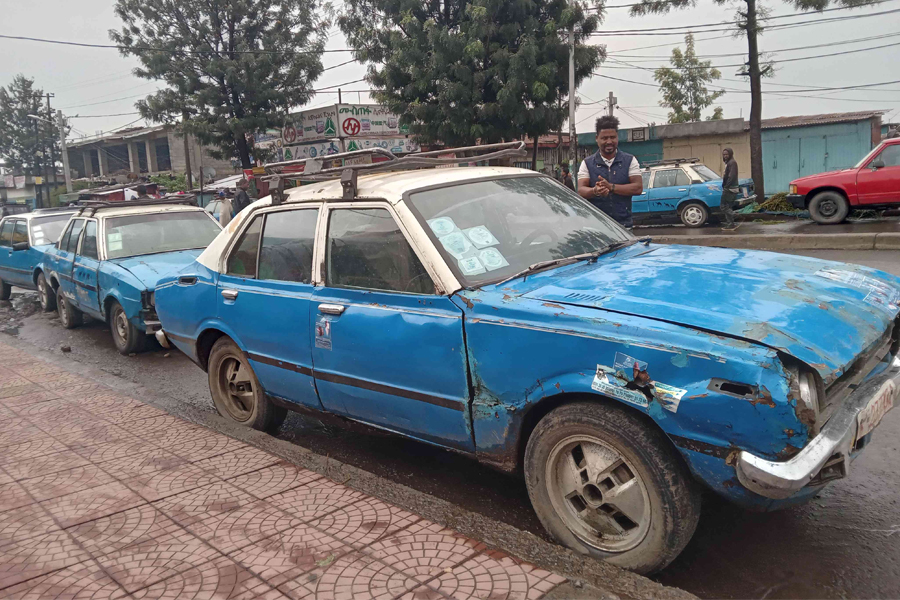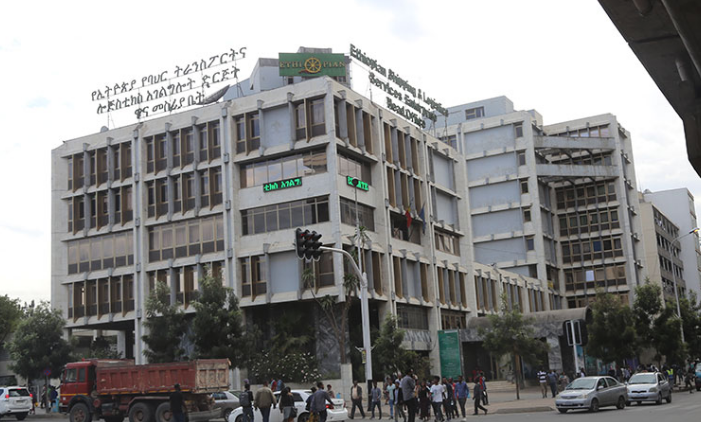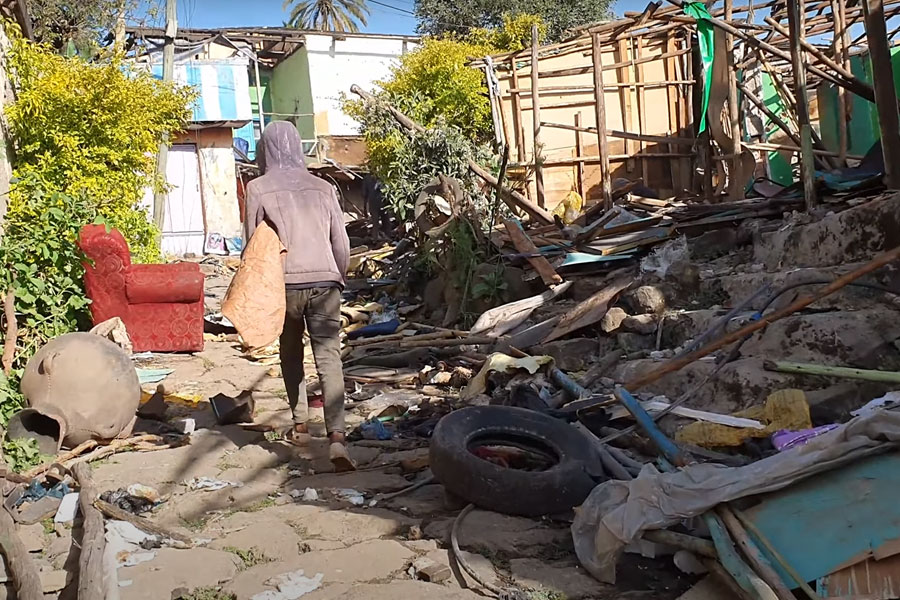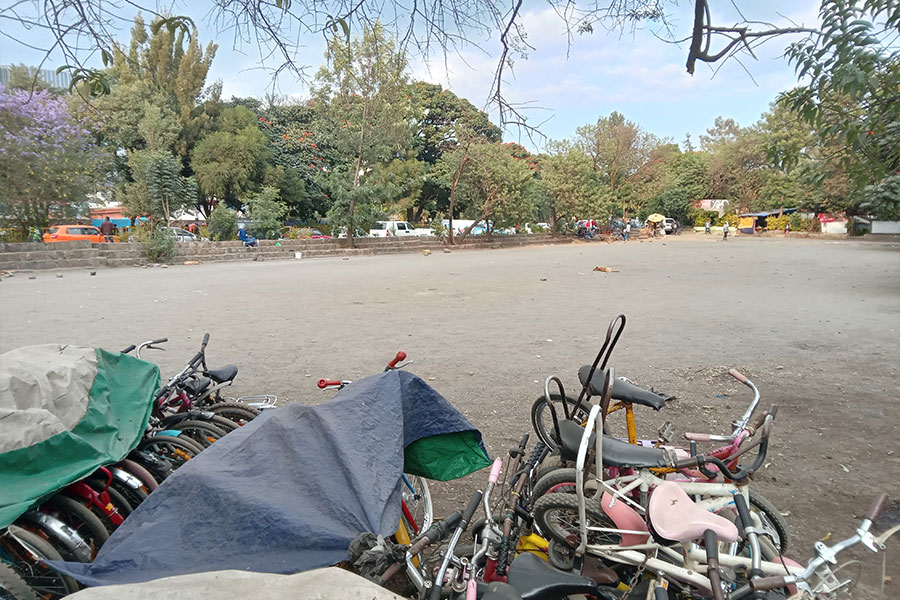
Radar | Aug 17,2019
Kidist Dessie, 28, is a mother of one that lives in a condominium around the Yeka Abado area. As a mother to an infant, the daily consumptions had forced Kidist to resort to informal delivery services by water trucks owned by individuals.
Despite filling up every jerrycan, bucket and barrel in the house whenever there is running water, she finds herself paying at least 2,000 Birr extra per month. Kidist has stopped drinking the water after coming across residues last year. However, she plans to continue using the water truck services for cooking and cleaning until a permanent solution is devised.
"A day without water is unimaginable," Kidist told Fortune. "The running water barely makes it to the upper floors."
Water truck owners have turned the lack of adequate water supply in the city into a job opportunity. The largely thirsty city seems to have adapted to the shortage by relying on these informal businesses that provide door-to-door water deliveries.
Construction sites that have slowed down activities due to a shortage of cement and input price hike used to take the bulk of deliveries. Now, the delivery has expanded to businesses that are dependent on water, such as car wash services and spas, while homeowners also take the share.
Tucked in a green Iveco water truck that belongs to his brother, Bamlaku Aschale has made his living by delivering water to homeowners and businesses around the CMC area for a little over a year.
His income rounds up to 5,000 Br in a slow week. As a driver for hire, he earns around 250 Br per trip, fitted with a 15,000ltr tanker that usually delivers nine orders. Bamlaku claims that his brother earns an average of 70,000 Br after expenses and is currently building a house in his hometown.
"Most truck owners hire drivers," he told Fortune.
The 24-year-old sends whatever money he has left from paying his 2,500 Br rent and extra expenses to his family that reside in Gonder, Amhara Regional State. His older brother had purchased the car for 900,000 Br, which now soared to 1.5 million Br. Bamlak fills up the truck by going to individual homes or businesses that have underground water access; they are charged around 600 Br per filling and sell for around 3,000 Br.
Freight trucks carrying home water tankers charge around 1,500 Br for 5,000ltr, while they get their supply from underground water wells for 200 Br. The gradual removal of fuel subsidies seems to be the major concern for these operators as their overhead cost is mostly benzene for the water pump and diesel for the car.
Kedir Seid, who manages a car wash around the CMC area, says that a 5,000ltr tanker can only get him through two days. While Kedir's car wash business is not solely reliant on water trucks for its supply, he considers them as a valuable tool.
"We depend on their supply, especially during the dry season," he told Fortune.
The Addis Abeba Water & Sewage Authority relies heavily on underground wells and surface water from Legedadi, Dire, and Gefersa dams. There are 68 water reservoirs and 220 underground wells that contribute up to 65pc of the supply.
The 5.2 million residents of the capital need 1.2 million cubic meters of water daily, of which the Authority supplies a mere 60pc amounting to 0.72 million cubic meters. A city-wide census has not been conducted in 16 years, hinting at a significantly larger population size due to rural-to-urban migration amidst growing instability in regional states.
To address the shortage, the Authority is providing water in shifts as a temporary solution and has dug 28 wells that can produce 75,000 cubic metres of groundwater per day.
Sirkalem Getachew, communications officer at the Authority, said aside from water supply through the pipe and collecting tariffs, the Authority has 40 trucks to deliver water when there is a supply disruption with up to 16,000ltr capacity each.
"It's provided for free," she told Fortune.
She emphasizes the illegality of private water truck delivery services.
"It is absolutely prohibited for anyone outside the Authority to sell water," she stressed to Fortune. The Authority charges seven Birr per thousand litres which is significantly lower than the fees charged by the water trucks.
Serkalem highlighted the consequences faced by companies that sell underground water without permission by issuing warnings, filing lawsuits, or removing their water counters. She said charges were filed against 14 organizations where two had lost their counters. However, their counters were returned to them after they promised not to repeat the offence. According to Serkalem, the Authority is working to find a sustainable solution but giving out licenses to pump water is not one of them.
The quasi-legal nature of the water trucks that operate under a liquid transport license is outstanding. Their utility to urbanites is recognized by legal experts who observe that opening up the sector to private investment might provide a lasting solution to the city's demands.
Yohannes Weldegebriel, a legal expert in commercial law, emphasises the importance of carefully managing water as a natural resource considering the risk associated with private water trucks supplying unpurified water to residents. He advises that the supply should be limited to construction sites and car washes.
While Yohannes acknowledges the illegality of privatising public utilities, he suggests that allowing the private sector by concession, similar to companies that generate electricity, could address the prevailing water scarcity. He said those who can afford the hefty investment to supply should be allowed to set their own rates and participate so those who can afford could have access.
"They do provide an alternative solution to water scarcity," he said.
PUBLISHED ON
Jun 24,2023 [ VOL
24 , NO
1208]

Radar | Aug 17,2019

Fortune News | Jan 12,2019

Radar | Sep 18,2021

Fortune News | Jun 20,2020

Fortune News | Feb 23,2019

Fortune News | Jul 22,2023

Fortune News | Jun 08,2019

Fortune News | Aug 22,2020

Agenda | Mar 23,2024

Radar | Dec 12,2023

Dec 22 , 2024 . By TIZITA SHEWAFERAW
Charged with transforming colossal state-owned enterprises into modern and competitiv...

Aug 18 , 2024 . By AKSAH ITALO
Although predictable Yonas Zerihun's job in the ride-hailing service is not immune to...

Jul 28 , 2024 . By TIZITA SHEWAFERAW
Unhabitual, perhaps too many, Samuel Gebreyohannes, 38, used to occasionally enjoy a couple of beers at breakfast. However, he recently swit...

Jul 13 , 2024 . By AKSAH ITALO
Investors who rely on tractors, trucks, and field vehicles for commuting, transporting commodities, and f...

Jul 5 , 2025
Six years ago, Ethiopia was the darling of international liberal commentators. A year...

Jun 28 , 2025
Meseret Damtie, the assertive auditor general, has never been shy about naming names...

Jun 21 , 2025
A well-worn adage says, “Budget is not destiny, but it is direction.” Examining t...

Jun 14 , 2025
Yet again, the Horn of Africa is bracing for trouble. A region already frayed by wars...